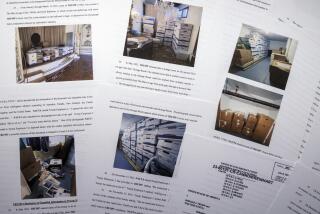Judge Who Presided Over 2 Miller Spy Trials Steps Aside for 3rd One
- Share via
In a highly unusual move, a federal judge who presided over two previous espionage trials of former FBI Agent Richard W. Miller disqualified himself Friday from taking on the case for a third time.
U.S. District Judge David V. Kenyon of Los Angeles said in a two-page statement that if he continued to preside over the case, “there is a strong likelihood that the proceeding will become a trial not of the defendant’s guilt or innocence but of the objectivity of this court.”
Kenyon’s decision came after defense attorneys announced they would seek to have the judge disqualified from presiding over a new trial scheduled to begin April 3.
Friday’s decision marked the end of a long road for Kenyon with the Miller case. He presided over Miller’s first trial, which lasted three months in 1985 and ended in a hung jury.
Miller, 52, was convicted by a jury in June, 1986, of passing FBI secrets to the Soviet KGB during an adulterous affair with Soviet emigre Svetlana Ogorodnikova. Evidence was introduced that he exchanged the secrets in return for sex, $15,000 in cash, $50,000 in gold and a British trench coat.
Miller, who had a long history of problems in the FBI, said his relationship with Ogorodnikova and her husband was part of an effort to become a double agent and penetrate a KGB spy ring. Ogorodnikova and her husband were subsequently sentenced to lengthy prison terms.
Kenyon sentenced Miller to two life terms plus 50 years, but the U.S. 9th Circuit Court of Appeals reversed the conviction last April and he was released Monday after posting $337,000 bail. He had been incarcerated for five years.
The appeals court said Kenyon had erred by admitting evidence showing that Miller had failed lie detector examinations during intense interrogation by his FBI superiors.
Polygraph tests are rarely admissible in federal trials. The appeals court said the value of the testimony in Miller’s case, which was introduced for limited purposes, was “slight indeed,” compared to “the overwhelming potential prejudice.”
In removing himself from the case Friday, Kenyon said the appellate ruling concerned him.
“The 9th Circuit’s decision, while scholarly and detailed, gives no indication that the reviewers fully understood the context in which the rulings were made,” Kenyon wrote.
Kenyon said his decision was based on a combination of personal and judicial reasons.
“This case has taken an inordinate amount of the court’s time and thought,” he explained. “Inevitably, after all that has transpired in a case of this magnitude, it seems logical that a judge may have stronger feelings than usual about such a case.
“From a personal standpoint, the prospect of retrying this case is particularly unappealing. It is the perception of this court that the case could become a trial more of the court’s patience than of the guilt or innocence of the accused.”
Kenyon said that while he “sincerely feels that justice was done and that the defendant has received a fair trial,” he was nonetheless prepared to follow the appeals court’s decision to retry the case.
“However, the court’s ability to be fair and impartial in this case has recently been called into question,” Kenyon said.
On the day Miller was released on bail, defense attorneys Stanley Greenberg and Joel Levine said they planned to file a motion asking that Kenyon be replaced as trial judge.
“We just think the history of the case suggests that justice would be served by a new and fair judge,” Greenberg said.
Kenyon said he thought it was “unlikely” that he would have been disqualified, but added: “It is clear that if this court continues to preside, there is a strong likelihood that the proceeding will become a trial not of the defendant’s guilt or innocence but of the objectivity of this court. It is for this reason that disqualification is warranted.”
Defense attorney Levine welcomed the decision.
“We think that Judge Kenyon did the appropriate thing because he realized that there was an appearance of impropriety which caused him to step aside in a judicious manner,” Levine said.
“The government commends the dedicated and conscientious manner in which Judge Kenyon handled a difficult and complex case and regrets his decision to recuse himself from the case,” said Assistant U.S. Atty. Russell Hayman, one of the prosecutors in the Miller case.
Kenyon, 59, has handled many high-profile cases since being appointed to the federal bench by then-President Jimmy Carter in 1980. But the Miller prosecution was the one that attracted the most attention from the news media.
Before the appeals court decision granting him a new trial, Miller had been the first FBI agent ever convicted of espionage. The reversal was the first in a major espionage conviction in more than five dozen prosecutions brought by the government since World War II.
It was not immediately known who the new judge will be. The usual procedure for selecting a judge is for a name to be picked out of an unmarked envelope by an official in the federal court clerk’s office.
More to Read
Sign up for Essential California
The most important California stories and recommendations in your inbox every morning.
You may occasionally receive promotional content from the Los Angeles Times.













